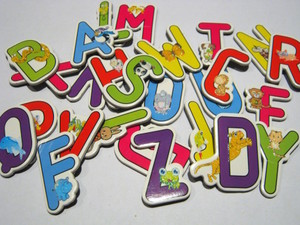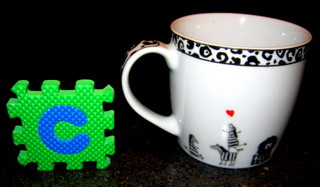Mastering Phonic Alphabet Prevents Reading Failure
You may not have heard of the phonic alphabet before but I'm sure you have heard of the alphabet. What you are probably asking yourself is what the difference between the two is. There is a difference and it is vitally important.
The alphabet is made up of 26 letters and represents
the symbols we use to communicate in English. When you were learning to read
you probably learned to chant the 26 alphabet letters in their correct order.
Chances are you learned the Alphabet Song. Many parents teach it to their children. It's catchy, it rhymes and it makes learning the 26 letters relatively easy. You may remember it.

It goes like this:
Abcdefg
hijklmnop
qrs
tuv
wx
y and z
Now you know your abc
Next-time won't you sing with me!
This song or the ability to chant the alphabet in the correct sequence is fun to learn and essential to know as reading progresses.
Focus on Phonic Alphabet
I have taught reading to many people, from 4 to 60 years of age. What I have discovered from this is that in the initial stages of learning to read... and I mean the very beginning stages... it is more important to focus on learning the phonic alphabet first.
So what is the phonic alphabet?
It is all about the initial sounds the alphabet symbols make. These are quite different from the alphabet letter names.
Avoid Confusion in Learners

When we say the sound the letter c makes we say ci as in the word cup.
Students of all ages struggle with this letter and often call it by its letter name which makes this sound, see. So when they try to read a word like cat they will say something like see ate.
When your child is first learning to read, it is more important that they can make the letter sounds, rather than the letter names.
Don't get me wrong. It is good to be familiar with the letter names and what the letters look like.
But by focusing on the letter names too early, children become confused and find it difficult to learn the initial letter sounds or phonic alphabet when they see the written symbols.
In the early stages of reading, your child needs to learn simple words and patterns by sounding them out. These are only two or three letters long.
They will learn words like cap, bun, sit, fan etc.
Long-term they will learn different combinations of sounds that can be made up from the phonic alphabet. Although there are 26 letters in the alphabet, there are about 44 different sounds we use to read and write!
This makes it a little more complex.
Here is an example of what they need to do in the early stages of reading... imagine your child is asked to read one of the first words children are taught.
Let's take the word am. If your child has the Alphabet Song stuck in their head they will try to say ay em when they read am.
The Real Problem
There is a real problem here, not only with beginner readers but also adults. They get stuck because they attempt to read by saying the letter names rather than the sounds the symbols make. This causes real confusion and slows up their ability to read.
They need to know that if they want to read a word like man that the alphabet letter m says mmmm rather than em, that a says aaaa as in apple, not ay and t says a very short ti sound rather than teeee.
If letter names are mistakenly used to read the word man it will be read as em ay en.
All adults I have taught, without exception, have struggled with a number of these sounds.
Vowel Struggles
It is important to mention here that the five vowels, a e i o u, make open sounds when we speak. We feel our jaw drop open a little when we say them. These can be pronounced in several different ways.
There are 'long' and 'short' vowels which are normally taught at a later stage, once the initial sounds of the alphabet have been mastered.
Now imagine you are one of the adults I mentioned earlier...but in this case you are having trouble with just one letter sound, let's say for example the a. Every time you see the letter a you say ay as in ape.
Now imagine this... here are 15 words that these adults might come across in their daily lives.
Each of them has the letter a once or twice inside them...
cat, apple, angry, damage, fantastic, manager, Cantonese, Japan, stand, anthropology, transport, mathematics, anthem, toucan, pan
You won't be able to say the a in each of the words correctly.
 |
Japan might be read be read as Jay payn mathematics might be read as maythemmaytics |
Appreciate The Difficulty
This is how some people with very low literacy levels read and this is only one letter in the phonic alphabet we are talking about here.
Most adults I teach have at least six sounds they cannot pronounce. When your child starts out to read, they will know none of the sounds so that might help you to understand the difficulty they could experience.
The Consequences
As a teacher of children and adults I often see the disastrous impact on those people's lives when they don't learn the appropriate reading skills.
Many of the adults who have come to me with literacy problems have been barely able to function in society due to their reading and writing disability.
One middle-aged man was unable to spell his daughter's name, write a shopping list or understand the bills coming through his mailbox!
To make matters worse, his wife was also struggling
with literacy. The entire family had to go to the supermarket when the couple
needed food. They couldn't get by without their children for help.
Parents Need To Ensure Learning Success
There are ways you can teach these skills in a sequential and thorough way to ensure the phonic alphabet is remembered. You can use cards, games and other activities.
This alphabet is one of the most important things your child will learn in the early stages of reading.
 |
Reading is like erecting a building. If the foundations are not solidly built the structure will collapse. |
The first stage of learning to read... being able to sound out the phonic alphabet... is crucial to long-term success in reading.
Most of the adults I have taught have had to re-learn and re-build their reading foundations at this very basic level.
The fact that they didn't somehow learn them half a lifetime before is an absolute tragedy!
It is paramount that your child learns the phonic alphabet, as an early reader, to ensure this doesn't happen to them. Without this knowledge, learning will be confusing and your child will get left behind.
Go From Phonic Alphabet to Phonics Rules
Go to Home Page




